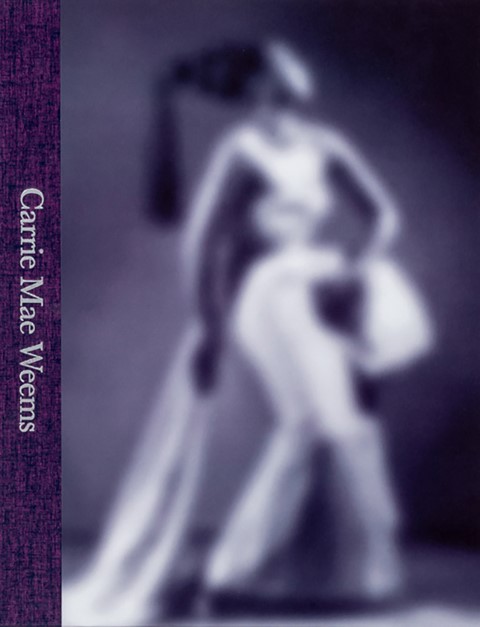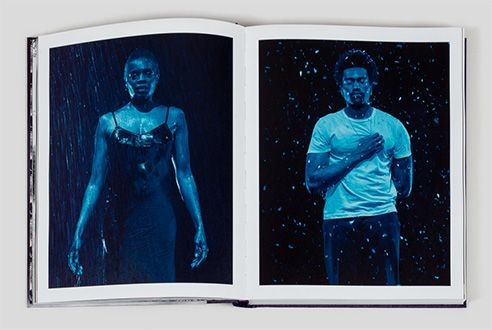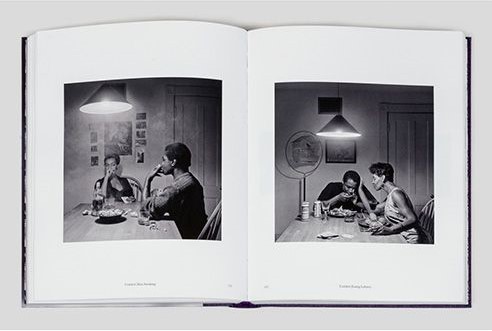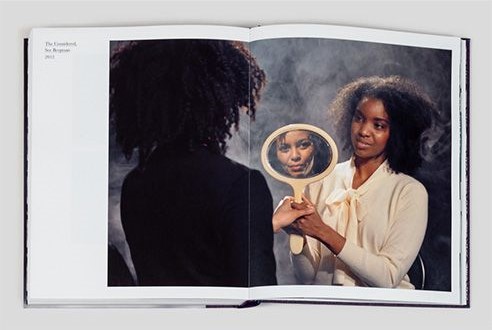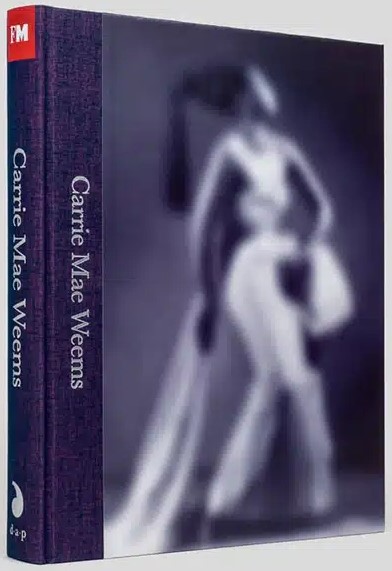L’une des artistes américaines les plus influentes qui travaillent aujourd’hui, Carrie Mae Weems étudie depuis plus de 40 ans les récits concernant la famille, la race, le genre, le sexisme, la classe et les conséquences du pouvoir. Son œuvre complexe, toujours en avance sur son temps et profondément formatrice pour les jeunes générations d’artistes, a employé la photographie (pour laquelle elle est surtout connue), le tissu, le texte, l’audio, les images numériques, l’installation et la vidéo.
Dans un article du New York Times, Holland Cotter décrit succinctement Weems comme « une excellente créatrice d’images d’une force morale, concentrée et irrépressible ».
Ce volume, couvrant quatre décennies de travail, est l’enquête la plus approfondie jamais publiée. Il comprend la première série de Carrie Mae Weems, comme Family Pictures and Stories, pour laquelle elle a photographié ses parents et ses amis proches, la légendaire Kitchen Table Series, dans laquelle elle a posé dans un cadre domestique, et d’autres œuvres et séries acclamées par la critique, comme Ain’t Jokin’, Colored People, From Here I Saw What Happened and I Cried, Not Manet’s Type, The Jefferson Suite, Monuments, Roaming, Museums, Constructing History (A Class Ponders the Future), Slow Fade to Black and the Obama Project, entre autres. Ces pièces sont contextualisées par des essais de LaCharles Ward et Fred Moten et une chronologie de Raul Muñoz.
Le livre comprend également un essai visuel de Carrie Mae Weems qui présente une sélection personnelle de ses propres œuvres du point de vue de l’artiste.
L’exposition accompagnée par ce catalogue est organisée par la Fundación MAPFRE en collaboration avec la Fundación Foto Colectania, Barcelone et Württembergischer Kunstverein, Stuttgart, où a lieu l’exposition de Carrie Mae Weems. L’expositionThe Evidence Of Things Not Seen a eu lieu du 2 avril au 10 juillet 2022.
One of the most influential American artists working today, Carrie Mae Weems has investigated narratives around family, race, gender, sexism, class and the consequences of power for more than 40 years. Her complex œuvre—always ahead of its time, and profoundly formative for younger generations of artists—has employed photography (for which she is best known), fabric, text, audio, digital images, installation and video. Writing in the New York Times, Holland Cotter succinctly described Weems as “a superb image maker and a moral force, focused and irrepressible.”
This volume, spanning four decades of work, is the most thorough survey yet published. It includes Weems’ earliest series, such as Family Pictures and Stories, for which she photographed her relatives and close friends; the legendary Kitchen Table Series, in which she posed in a domestic setting; and other critically acclaimed works and series such as Ain’t Jokin’, Colored People, From Here I Saw What Happened and I Cried, Not Manet’s Type, The Jefferson Suite, Monuments, Roaming, Museums, Constructing History (A Class Ponders the Future), Slow Fade to Black and the Obama Project, among many others. Contextualizing these pieces are essays by LaCharles Ward and Fred Moten and a chronology by Raul Muñoz. The book also includes a visual essay by Weems that presents a personal selection of her own works from the artist’s perspective. The accompanying exhibition is organized by Fundación MAPFRE in collaboration with Fundación Foto Colectania, Barcelona and Württembergischer Kunstverein, Stuttgart, where the exhibition Carrie Mae Weems. The Evidence Of Things Not Seen took place from April 2 through July 10, 2022.

